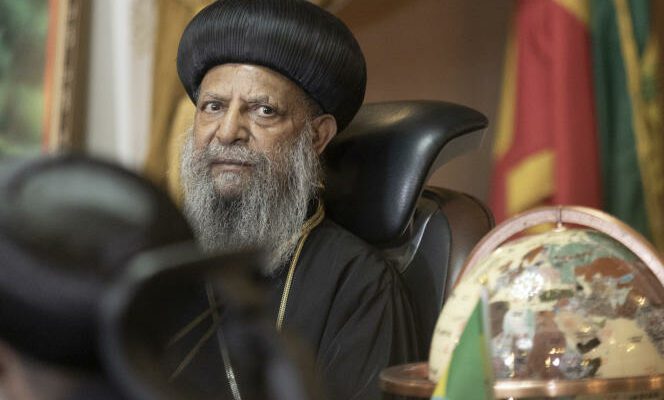cancellation, in extremis, Demonstrations scheduled for Sunday February 12 in Addis Ababa have not appeased the tensions which are tearing the Orthodox Church in Ethiopia. The crisis began on January 22 when three archbishops from the Oromo community decided to break with the Holy Synod, the supreme authority of the Tewahedo (“united” in Amharic) Church, one of the oldest in Christianity.
The institution, led by Patriarch Abuna Mathias for a decade, represents about 40% of believers in this country of 115 million people. Authorities fear a schism within it will escalate into a political and community crisis, as Ethiopia is just emerging from two years of civil war in Tigray province – one of the deadliest conflicts in recent years. Access to several social networks such as Telegram, Facebook and YouTube was restricted on Thursday to limit the excitement.
The rebellious archbishops, who have ordained 25 bishops grouped within a “Synod of Oromia, nations and nationalities”, denounce the lack of diversity and inclusiveness of the Tewahedo Church, which “threat of extinction in the southern areas of the country”. According to them, the problem is linguistic and cultural. The Orthodox clergy uses the Ge’ez alphabet – that of the Amharic and Tigrinya languages -, while in the Oromia region, Afaan Oromo is a Cushitic language using the Latin alphabet since 1991.
“The appointment of bishops from other communities within Oromia has contributed to the weakening of the Orthodox Church, because the spiritual leaders do not know the language and culture of the faithful”, believes Abuna Sawiros, the archbishop behind the schism. According to him, the Holy Synod would be made up of 85% bishops from the Amhara and Tigray regions, which historically represent the center of gravity of the Christian religion in Ethiopia.
Eight worshipers killed in Shashamane
The Holy Synod, stunned by the announcement of the dissenting bishops, immediately excommunicated them. The Patriarchs of the Tewahedo Church have further instructed worshipers to wear black as a sign of solidarity, to protect Orthodox buildings and to gather for a “martyrs’ march” on Sunday.
The tension escalated following statements by Prime Minister Abiy Ahmed, himself an Oromo, on 1er FEBRUARY. The head of government, for whom “ both sides have legitimate demands and their own truths », is accused by the Orthodox Church of interfering in religious affairs. “According to our information, the government has formed an alliance with the illegal group that our Church condemns, and it continues to support it”assured Patriarch Mathias on February 6.
“Priests have been beaten, harassed, expelled from their churches and arbitrarily arrested”
This questioning comes after the death of eight Orthodox faithful in Oromia, in the city of Shashamane, on February 4. The young believers were killed by Oromia special forces as they defended their church against the new synod’s coup. Wider, “priests [hostiles au schisme] were beaten, harassed, expelled from their churches and arbitrarily arrested” in the rest of the region, assures the Ethiopian Human Rights Commission.
This sudden escalation bears witness to the deep divisions that run through the Tewahedo Church. “Since imperial times, it has been at the center of political power in Ethiopia”underlines Diego Maria Malara, professor of anthropology at the University of Glasgow, recalling that the patriarchs appointed to head the Holy Synod are almost always supporters of the regime in place.
Martyrs’ march canceled
A previous schism had destabilized the Church for twenty-seven years, before ending in 2018. More recently, the unity of the Church’s patriarchs was undermined during the civil war in Tigray. Patriarch Mathias, himself a Tigrayan, described the conflict as “genocidal”. On the other side, “Certain bishops are accused of having galvanized Abiy Ahmed’s war effort during the conflict in Tigray”, adds Diego Maria Malara. Not to mention that some of the Tigrayan bishops have also been on their own since the civil war.
“The current problem is not only linguistic. Masses and ceremonies are already done in Afaan Oromo, tempers an academic who does not wish to be named. Obviously, this is a question of power. We are witnessing a transposition of ethnic tensions and claims within the Church. »
“History repeats itself in Ethiopia, and the question of nationalities and diversity resurfaces”assures the Reverend Samuel Berhanu, a spokesperson for the new synod, in reference to the tensions between different “ethno-regional” groups which have torn this multi-ethnic country apart since the 1960s. Originally from Oromia, Samuel Berhanu campaigns for the recognition of Afaan Oromo as the official language of the Orthodox Church and the State.
Newsletter
“The Africa World”
Every Saturday, find a week of news and debates, by the editorial staff of “Monde Afrique”
Register
In order to put out the fire that has gripped Ethiopian society, Abiy Ahmed and the Holy Synod, in a rare deal, agreed to cancel Sunday’s rally. The “martyrs’ march” promised to be particularly eruptive given the sensitivity of the subject. However, the Prime Minister has every interest in calming things down: he receives African heads of state during the African Union summit on 18 and 19 February.
